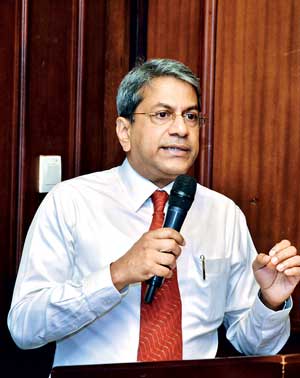Monday Feb 16, 2026
Monday Feb 16, 2026
Tuesday, 13 March 2018 00:21 - - {{hitsCtrl.values.hits}}
By Charumini de Silva
Fitch Ratings last week called on regulators for a stringent, common platform that will maintain well-defined methodology for assigning ratings, while signalling that there are steps taken to allow once-blocked rating agencies back into the business with political interference.
“The rating business is not something like handing out ratings. It is not signing papers or an alphabet. There is a method to doing it and it has very serious implications. Normally, you are not allowed to get into the same business when a rating agency was found for assigning incorrect ratings. The ‘fit and proper’ obligation needs to be properly governed,” Fitch Ratings CEO Maninda Wickramasinghe said at a seminar on ‘How Important Ratings are in a Capital Market’, organised by the Institute of Certified Management Accountants of Sri Lanka (CMA). Noting that the current minimum capital requirement for a rating agency is Rs. 35 million, which sounds like pocket money in today’s context, he said that Sri Lanka could have rating agencies mushrooming by the dozen, if the regulations and standards are not maintained to a certain level.“It is important to have a lot more stringent regulations about setting up new rating agencies, so that they will learn a lesson, mercifully with not too much of fallout,” he added.
He pointed out that Sri Lanka had an agency that was suspended from rating because the firm had serious conflict of interests. “The rating agency had directors who were directors of companies in firms that were rated. These are serious conflicts of interests. It is amazing how a rating agency could operate just like that,” he pointed out.
According to Wickramasinghe, in the Securities and Exchange Commission (SEC) code for rating agencies, it is very clearly stated what their moral obligations are. The Daily FT learns that due to political interference, a once-troubled rating agency will return to business. However, the stakeholders pointed out that this political interference has become a major hindrance to the economy at large. Emphasising that rating agencies are independent organisations, Wickramasinghe stressed that they must remain independent. “Don’t use ratings to circumvent a system,” he added.
He said when they look at companies to assign ratings; they consider the type of business, operating environment, economic environment, external environment, interest rates, exchange rates, whether there is a monopoly in business, is the business subject to political risks.
It was pointed out that institutional investors in both the developed and developing world rely heavily on rating agencies in making investment decisions.
However, in Sri Lanka, he said, most ordinary people do not have an idea about the rating of a company, and it was one of the key reasons why many people burnt their fingers by investing on financial companies that did not have a stable outlook.
Pic by Upul Abayasekara